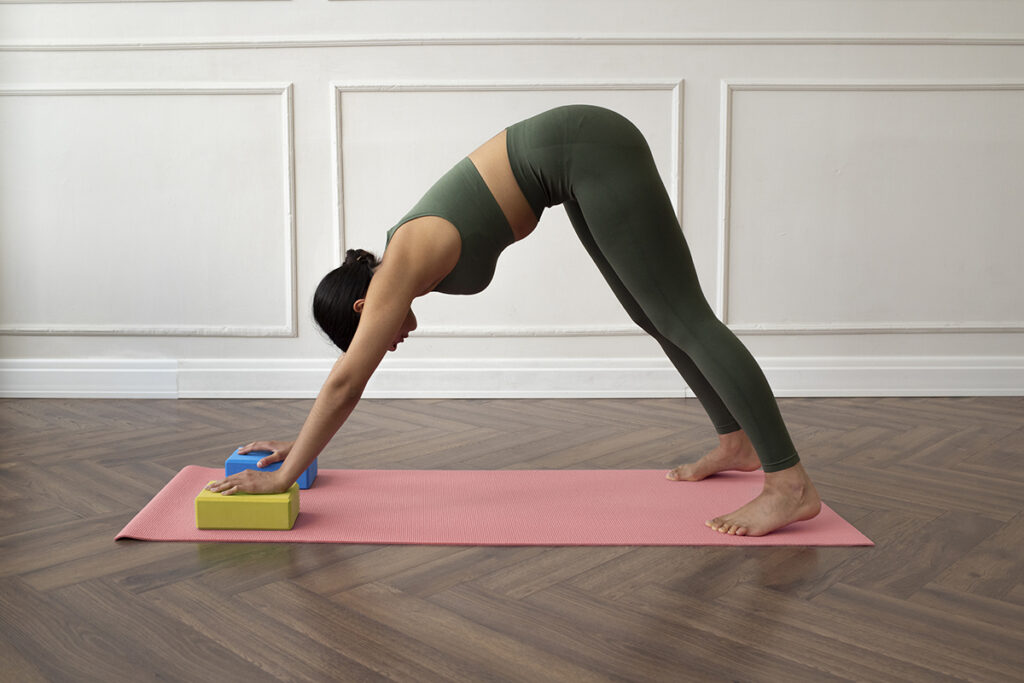Posture is one of the biggest problems in the modern world. Many people have sedentary jobs, sitting in front of computers all day; in the evenings, we sit on soft sofas with our feet tucked up, slouched or sprawled, which actually seems quite comfortable at the time. But over time, this can lead to issues with posture, creating many problems, including back pain, issues with digestion, problems with the heart, and potentially even permanent changes to the curvature of the spine. However, earning money is non-negotiable, and in the evenings, why shouldn’t we be able to sit in a way that feels comfortable? Most people will not change the way they live to any great degree, but the good news is that a regular yoga practice can actually help combat the problems created by having a poor posture and yoga blocks can really help too.

Daily Realigning
Take it from us; your body will thank you if you spend the time realigning your spine and improving your posture every day. It doesn’t have to take hours, and if you’re struggling to fit in a long yoga session, then cherry-pick a couple of these exercises to do, preferably right before you go to bed or after you have spent a long time sitting down.
1. Supported Fish Pose
If you only have time for one good stretch before bed, make it this one. When we sit and slouch, our spine tends to be rounded forwards. Even sitting at a desk, we tend to allow our posture to slip, and this curvature of the spine can lead to shoulder and back pain. The best way to correct this is to invert the shoulders and spine, taking them in the opposite direction to the classic sitting, hunched back and shoulders. The supported fish pose is a great place to start. Before you lay on your back, place one yoga block horizontally along the yoga mat, standing on the longest edge so it is at the mid-height, where your head will rest. Place your other yoga block vertically to form a T with a gap of about four or five inches, also standing on its long side. You can adjust them to the best place once you are ready.
Lay down on your back, allowing the first yoga block to sit longways between your shoulder blades and rest your head on the second block. The block between your shoulders needs to sit longways, and the mid-height is usually about right for most people. If you feel that your head is not properly supported, you can adjust the headrest block to stand on the short edge, making it taller. Getting the yoga block between your shoulder blades to be perfectly positioned is trial and error, and it helps open your chest so should not feel uncomfortable. Once you are in position, allow your hands to relax by your sides with the palms facing up. Stay there for about five minutes.
2. Supported Legs Up the Wall (Viparita Karani)
As you’ll be laying on the floor anyway, you could continue to be Supported Legs up the Wall Pose, which is incredibly restorative and helps to not only a line the spine, but it reduces inflammation in the legs and makes it much easier for the heart to effectively circulate blood. As the pose suggests, you need access to a wall for support, and you want to shuffle your bottom close to the wall and then pop your yoga brick horizontally across the mat under your bottom to lift your hips slightly higher off the ground. Raise your legs up straight and adjust your position to shuffle as close to the wall as you can. Your hands should rest by your sides with your palms downwards. Again, stay in the place for about five minutes. Some people prefer a yoga bolster under the hips, and this would also work well, so experiment to see which you prefer.
3. Reclined Bound Angle Pose

Allow your body to relax and place your hands lightly on your stomach. Focus on your breathing and feel your stomach expand as you breathe in, filling the body with air and contracting as you breathe out, releasing tension. If this pose is straining your lower back in any way, simply roll up a towel and place it under the arch in your back. This is the perfect relaxation position to listen to some meditation music, so you can remain in the pose for as long as feels comfortable. Just remember, once you have been doing floor work, turn on your side and come up slowly, giving your blood pressure a chance to realign.
The Takeaway
So there is little doubt that yoga is one of the best ways to help reverse the effects of bad posture caused by a sedentary lifestyle. 


